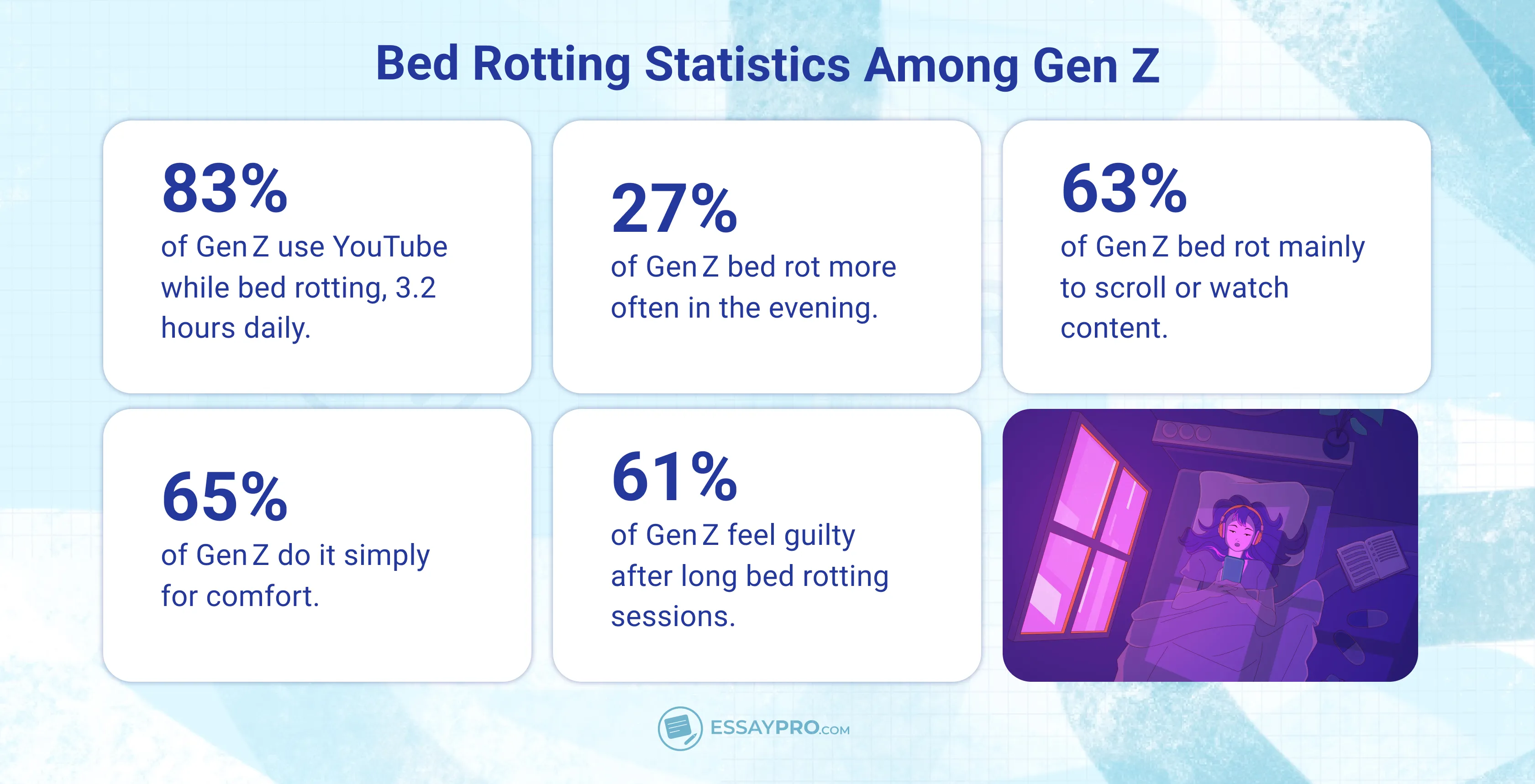Key Takeaways
- Bed rotting is common among Gen Z, with most spending weeks per year in bed awake.
- Social media drives the trend of staying in bed for days on end.
- Moderate bed rotting offers benefits, but too much disrupts sleep and builds guilt.
- Excessive bed rotting may signal depression.
Almost nine out of ten Gen Zers admit they've spent entire stretches of time just lying in bed, doing anything but sleeping. The same survey showed they rack up nearly 500 hours a year this way – that's about three solid weeks spent under the covers. The numbers are eye‑opening and say a lot about how this generation is leaning into downtime.
This article looks at why the bed rotting trend has caught on and why so many people see it as self‑care rather than laziness.
If you're a student trying to recover from burnout, getting a little help will surely be more helpful than spending hours in bed. EssayPro can make school life easier for you: whether you need a reliable book report service or any other kind of academic help, you can always count on our professional help.
💬 "My Life Would be Better If I..."
Find the full list of study and life principles and start building a life where you consistently outdo your past self and embrace growth daily.
Leave your thoughts and ideas in EssayPro Community👇 Try it, it's completely free.


What Is Bed Rotting?
Bed rotting is exactly what it sounds like: staying in bed all day, wide awake, doing almost nothing. Endless scrolling, even just staring at the ceiling. As long as they don't have to move. The term started popping up on TikTok, where videos of people wrapped in blankets with no plans quickly went viral.

Bed rotting symptoms include spending long hours in bed, paired with low energy and little motivation to get up. When these signs become frequent, they can indicate that the habit is moving beyond simple rest.
What began as a simple way to describe "I'm not leaving my bed today" turned into a way to live. For many in Gen Z, it's a quiet rebellion against packed schedules and constant noise. The bedroom becomes a soft retreat where doing nothing becomes a small act of taking care of yourself.
Why Gen Z Can't Get Enough of Bed Rotting
Life feels like a constant performance for many young people. Constant academic and social expectations, with the endless scroll of social media, create a hard-to-escape loop. Trends like coffee badging show how people try to push back against constant demands in the workplace, while bed rotting gives a pause button, something like a step out of the pressure cooker.
Social media glamorizes bed rotting. Platforms like TikTok are filled with videos of people cozied up with blankets and snacks, making the idea feel almost inspirational. Statistics reveal just how tied this trend is to digital downtime:

- 83% of Gen Z use YouTube while in bed, spending an average of 3.2 hours a day on the app.
- 27% of Gen Z prefer to bed rot in the evening, a higher rate than other generations.
- 63% of Gen Z say scrolling social media or watching content is their main reason for bed rotting.
- 65% of Gen Z admit they do it simply because it feels comfortable.
- 61% of Gen Z report feeling guilty after spending extended time bed rotting.
The Upside of Bed Rotting
Contrary to popular belief, bed rotting can actually offer real benefits, but only when done in moderation. It's not fair to completely dismiss it as laziness, as many experts do. For many, this habit is a low-effort form of self-care that can help recover from everyday strain. Some positives of bed rotting include:
- Mental reset – lying in bed without responsibilities gives your brain a break.
- Lower stress levels – extended rest can reduce feelings of anxiety.
- Physical comfort – staying in a comfortable environment can soothe tension.
How Bed Rotting Affects Your Sleep
Unfortunately, the bed rotting habit can backfire in more ways than one. Sleep disturbance is probably one of the biggest drawbacks of this habit. When you bed rot for a long time, your brain starts to associate your bed with scrolling instead of resting. This weakens the natural link we have between lying down and falling asleep.
Scientists warn us to treat our beds as a space for sleeping only. If we need to watch screens before we go to sleep, it's best if we find a comfortable spot somewhere else in the house and only go to bed when we're actually ready to sleep.
An excessive use of screens during bed rotting sessions adds a whole other layer of trouble: blue light from devices blocks melatonin production, which disrupts our natural sleep rhythm.
Bed Rotting and Its Connection to Depression
Excessive bed rotting should call for attention. When spending all your time in bed becomes the default, it probably points to much deeper mental health struggles. The term bed rotting depression keeps appearing in conversations lately, which shows that there's a clear overlap between extended periods of physical inactivity and symptoms of depression.
The bed rotting trend can mask the warning signs of depression: isolation and losing interest in activities can be passed off as simply resting. What's dangerous about this is that spotting the moment it becomes something serious will be harder to spot.
How Can You Avoid Bed Rotting This Summer
Summer is perfect for self care activities. There are a lot of ways to pull yourself out of the sheets if bed rotting has become your main escape route. A few intentional changes in your day can truly make all the difference.
Set a Morning Routine
Give yourself something other than opening DMs to look forward to when you wake up. Instead of lying in bed scrolling, let the sunlight hit your face and move your body as soon as you open your eyes, even if it's just stretching for a couple of minutes. A pleasant routine will make it a lot easier to shake off the urge to stay under the covers. You can even start your day by listening to some motivational songs for students so you can get ready to face the day.
Plan Activities You'll Want to Do
You're more likely to get up when there's something enjoyable waiting for you (that's why the morning routine matters, too). Schedule small moments, like meeting a friend for coffee or wandering through a weekend market. Staying in bed will be less tempting when your day has an aura of excitement.
If you have one of those days where you have unavoidable responsibilities, you can learn to create an Eisenhower matrix for students. This method allows you to differentiate between urgent and non-urgent tasks so you don't worsen your burnout by trying to do everything at once.
Keep Screens Out of Bed When You Can
Phones and tablets make it far too easy to stay put for hours. Try leaving your devices on a desk or dresser instead of beside you. Without endless videos and feeds at arm's length, you'll naturally cut back on long scrolling sessions and save your bed for real rest.
Find a Spot Away From the Bedroom
Sometimes you just want to lounge. That's fine. No one said it's forbidden to rest. But do it away from where you sleep. Set up a spot outside your bedroom: a corner with a comfy chair and good lighting can work wonders. It will also help you stop associating comfort with staying in bed all day.
How to Keep Bed Rot Safe
Staying in a good place (mentally and physically) doesn’t necessarily require you to quit bed rotting altogether. What matters is treating it like a planned reset and not an escape from the outside world. Save it for the days when you’re truly running on empty; don’t let it creep into the corners of your weekdays.
If you do need to spend a long time in bed, you can make a few tweaks to make it less draining. Crack a window so air can get in and make sure to shut off your screens at least an hour before you plan to sleep. If you feel like staying in bed is starting to mess with your mood, it’s a definite sign you need to pull back. Bed rot can really give you some time to recharge as long as you use it with awareness.
Closing Thoughts
The bed rotting wave speaks loud and clear about how much Gen Z needs quiet moments and spaces to just be. There's nothing wrong with staying under the covers for a bit longer than you planned, but once it starts swallowing entire days, it does raise a red flag. Rest should leave you feeling lighter, not even more stressed.
Students know better than anyone how easy it is to run out of steam. When this happens, it's better to ask for a little help instead of retreating back into bed to try to avoid responsibilities. EssayPro allows you to hand off some of the stress to professionals: we offer reliable writing assistance and general academic support for when the deadlines close in. Throw in a few good learning podcasts while you're at it, and you can actually mix rest and productivity in a way that works for you.
Stuck on Your Essay?
Our experts are ready to guide you, step by step.
FAQ
Is Bed Rotting Just Depression?
Not always. Many people are using this trend to simply recharge without feeling rushed. But when resting turns into days of isolation and loss of interest in everything else, it usually points to something deeper, like depression.
What Causes Bed Rotting?
Most often, the reasons behind the bed rotting habit come down to mental overload. Constant pressure to be present and perform can easily push a person to seek comfort in their bed. Social media plays a role too, because it turns the idea into a normalized trend.
How Long Can Bed Rotting Last?
There isn't a set time limit. For some, it's a few hours on a lazy Sunday; for others, it stretches into full days. Occasional bed rotting is usually harmless, but when it becomes a daily pattern that's hard to break, it can affect almost all aspects of your life.

Ana Ratishvili
Ana is a professional literary writer with a Master’s Degree in English literature. Through critical analysis and an understanding of storytelling techniques, she can craft insightful guides on how to write literary analysis essays and their structures so students can improve their writing skills.
- The Rise of Bed Rotting: How and Why Americans Are Doing It - Amerisleep. (2025, March 27). Amerisleep. https://amerisleep.com/blog/bed-rotting-survey/
- Guardian staff reporter. (2023, June 5). Bed rotting: why it is time to embrace your quilt – without the guilt. The Guardian; The Guardian. https://www.theguardian.com/lifeandstyle/2023/jun/05/bed-rotting-why-it-is-time-to-embrace-your-quilt-without-the-guilt







